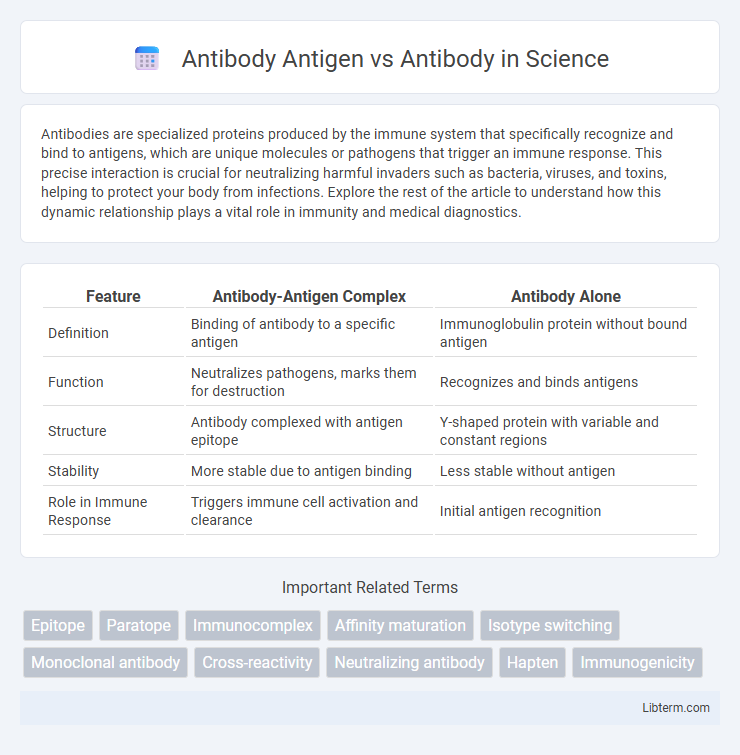Antibodies are specialized proteins produced by the immune system that specifically recognize and bind to antigens, which are unique molecules or pathogens that trigger an immune response. This precise interaction is crucial for neutralizing harmful invaders such as bacteria, viruses, and toxins, helping to protect your body from infections. Explore the rest of the article to understand how this dynamic relationship plays a vital role in immunity and medical diagnostics.
Table of Comparison
| Feature | Antibody-Antigen Complex | Antibody Alone |
|---|---|---|
| Definition | Binding of antibody to a specific antigen | Immunoglobulin protein without bound antigen |
| Function | Neutralizes pathogens, marks them for destruction | Recognizes and binds antigens |
| Structure | Antibody complexed with antigen epitope | Y-shaped protein with variable and constant regions |
| Stability | More stable due to antigen binding | Less stable without antigen |
| Role in Immune Response | Triggers immune cell activation and clearance | Initial antigen recognition |
Understanding Antibodies: Structure and Function
Antibodies are Y-shaped proteins composed of variable and constant regions that enable specific binding to antigens, facilitating immune response. The antigen-binding sites located at the tips of the variable regions recognize unique molecular patterns on pathogens, triggering neutralization or marking them for destruction by immune cells. Antibody-antigen interactions are highly specific, driven by non-covalent bonds, which optimize immune recognition and clearance of foreign invaders.
What Are Antigens? Nature and Types
Antigens are molecules or molecular structures that the immune system recognizes as foreign, triggering an immune response. They are typically proteins or polysaccharides found on the surface of pathogens like bacteria, viruses, or other foreign substances. Types of antigens include exogenous antigens from outside the body, endogenous antigens generated within cells, and autoantigens, which are self-molecules that can sometimes provoke autoimmune reactions.
Antibody-Antigen Interaction: The Immune Response
Antibody-antigen interaction is a critical mechanism in the immune response where antibodies specifically bind to antigens, such as pathogens or foreign molecules, to neutralize or mark them for destruction. The binding occurs at the antibody's variable region, which recognizes unique epitopes on the antigen, triggering processes like opsonization, complement activation, and neutralization. This precise recognition and binding facilitate the immune system's ability to identify and eliminate harmful invaders, ensuring adaptive immunity and immunological memory.
Antibody vs Antibody: Key Differences Explained
Antibody-antibody interactions involve the binding between immunoglobulins, whereas antibody-antigen interactions are the specific recognition of foreign molecules by antibodies. Antibody-antibody binding can lead to immune complex formation or therapeutic antibody applications, while antibody-antigen binding triggers immune response and pathogen neutralization. The specificity and affinity differences distinguish antibody-antigen recognition from the broader antibody-antibody interactions critical in immunology and biotechnology.
The Role of Antibody-Antigen Complexes in Immunity
Antibody-antigen complexes are critical in immune defense by specifically binding to pathogens, marking them for destruction by immune cells such as macrophages and neutrophils. These complexes trigger complement activation, leading to pathogen lysis and enhanced phagocytosis through opsonization. Efficient formation and clearance of antibody-antigen complexes prevent infection spread and contribute to immunological memory development.
Monoclonal vs Polyclonal Antibodies in Antigen Recognition
Monoclonal antibodies recognize a single epitope on an antigen, providing high specificity and uniformity in antigen binding, which is crucial for diagnostic and therapeutic applications. Polyclonal antibodies, derived from multiple B cell clones, bind to multiple epitopes on the same antigen, enhancing sensitivity and overall antigen recognition but with less specificity. The choice between monoclonal and polyclonal antibodies depends on the desired balance between specificity and sensitivity in antigen detection assays.
Clinical Applications: Antibody-Antigen vs Antibody Therapies
Antibody-antigen interactions underpin diagnostic tools such as ELISA and immunohistochemistry, enabling precise detection of pathogens and biomarkers in clinical settings. Antibody therapies leverage monoclonal antibodies to target specific antigens on cancer cells, autoimmune diseases, or infectious agents, providing targeted treatment with reduced systemic toxicity. Innovations in antibody engineering, including bispecific antibodies and antibody-drug conjugates, enhance therapeutic efficacy and expand the clinical applications of antibody-based treatments.
Diagnostic Techniques: Harnessing Antibody and Antigen Detection
Antibody and antigen detection are pivotal diagnostic techniques used to identify the presence of infections, autoimmune disorders, and allergies by targeting specific immune molecules. Antigen detection assays, such as enzyme-linked immunosorbent assay (ELISA) and rapid antigen tests, directly identify pathogenic proteins, enabling early diagnosis. Antibody detection tests measure host immune response, providing insights into past or ongoing infections through immunoglobulin profiling and serological assays.
Recent Advances in Antibody-Antigen Research
Recent advances in antibody-antigen research emphasize high-throughput sequencing and structural biology techniques, enabling precise mapping of antibody binding sites and affinity maturation. Cryo-electron microscopy and X-ray crystallography have revealed detailed antigen epitope structures, facilitating the design of next-generation monoclonal antibodies with enhanced specificity and neutralization capacity. Machine learning algorithms accelerate the prediction of antibody-antigen interactions, improving therapeutic antibody development against emerging pathogens.
Future Perspectives: Innovations in Antibody and Antigen Study
Emerging technologies in antibody and antigen research are revolutionizing diagnostics and therapeutics, with advancements in single-cell sequencing and artificial intelligence enabling precise mapping of immune responses. Novel antibody engineering techniques, such as bispecific antibodies and antibody-drug conjugates, promise targeted treatments with enhanced efficacy and reduced side effects. Integration of bioinformatics and structural biology tools accelerates the discovery of antigenic epitopes, facilitating the design of next-generation vaccines and immunotherapies.
Antibody Antigen Infographic

 libterm.com
libterm.com